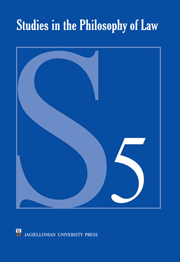Book contents
- Frontmatter
- Contents
- Preface
- I Legal Implications of Medical Advances
- II Evolutionary Approach to the Normativity of Law
- 5 Some Remarks on the Naturalization of Law
- 6 Revisiting ‘Equality in Exchange Revisited’: Contemporary Evolutionary (Genetic and Cultural) Approaches to Human Behaviour and the Normativity of Law
- 7 Legal Positivism and Evolutionary Psychology: Can Legal Positivists Learn Something from Darwin?
- 8 Neurolaw. A New Paradigm in Legal Philosophy
- 9 The Question of Non Human Primates Morality
- 10 Animals as Moral Agents
- III Appendix
- About the Authors
9 - The Question of Non Human Primates Morality
from II - Evolutionary Approach to the Normativity of Law
Published online by Cambridge University Press: 05 September 2014
- Frontmatter
- Contents
- Preface
- I Legal Implications of Medical Advances
- II Evolutionary Approach to the Normativity of Law
- 5 Some Remarks on the Naturalization of Law
- 6 Revisiting ‘Equality in Exchange Revisited’: Contemporary Evolutionary (Genetic and Cultural) Approaches to Human Behaviour and the Normativity of Law
- 7 Legal Positivism and Evolutionary Psychology: Can Legal Positivists Learn Something from Darwin?
- 8 Neurolaw. A New Paradigm in Legal Philosophy
- 9 The Question of Non Human Primates Morality
- 10 Animals as Moral Agents
- III Appendix
- About the Authors
Summary
He who understands baboons would do more toward metaphysics than Locke.
Ch. Darwin, NotebookIntroduction
Walking in Darwin's footsteps, numerous researchers have turned toward evolutionary theory for “the examination of a hypothesis concerning the factual matter of whether, and in what sense, and to what degree, human morality is the product of the process of biological natural selection.” The questions of morality have been partly taken over from the hands of philosophers and “biologized” as E.O. Wilson already recommended more than three decades ago. In spite of the fundamental disputes undertaken in general evolutionary theory, many specific empirical disciplines work on the adequate description and explication of particular morality-related issues. Neuroscience tries to map the “moral brain,” meanwhile by examining children in their earliest years, developmental psychology studies ontogenetic changes in the processes of moral reasoning and the emergence of the distinction between moral and other norms. Moral psychology studies universal cognitive and emotional psychological mechanisms related with morality (e.g. moral judgments, moral dilemmas) and “universal across cultures moral domains.” Recently, primatology has also contributed to the “biologizing of morality” enterprise, mainly by searching for and examining “proto-morality” or “the evolutionary building blocks of morality” in non human primates (hereafter termed NHP).
- Type
- Chapter
- Information
- Studies in the Philosophy of LawLaw and Biology, pp. 135 - 154Publisher: Jagiellonian University PressPrint publication year: 2010

